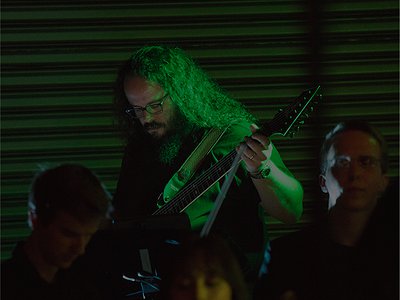Name: Nicholas Deyoe
Nationality: American
Occupation: Composer/Conductor/Guitarist
Current Release: For Duane at Populist Records
Recommendation: "We Are All Afraid of Repeating the Mistakes that I Have Already Made" and "A Fixed, Formal Arrangement" by Allison Carter, whose words appear in the song cycle that I mentioned above / I’m always fascinated by Jessie Brugger’s work. She made an incredible animation to one of my pieces a few years ago, and also did the artwork for my new album “for Duane.” I really love Jessie’s use of color and texture, her ways of distorting images, and how she blends abstract and direct imagery.
Website / Contact: If you enjoyed this interview with Nicholas Deyoe, visit his website www.nicholasdeyoe.com for news and performances.
When did you start composing - and what or who were your early passions and influences?
I started composing when I was about 16. I was really into both punk rock and jazz, and was trying to write music for myself to play in both areas. I was really attracted to how raw and physical both could be.
For most artists, originality is first preceded by a phase of learning and, often, emulating others. What was this like for you? How would you describe your own development as an artist and the transition towards your own voice? What is the relationship between copying, learning and your own creativity?
For quite a while, I was definitely trying out “in the style of” work, but could never really settle on what I was trying to create. Mostly, I was trying to take the things I love the most from composers like Nono, Feldman, Boulez, Rihm, Saariaho, and Gubaidulina and filter them into something of my own. Eventually, these influences (and hundreds of others) became filtered enough through my own processes that I didn’t find myself thinking about what somebody else had done anymore, and was just imagining sound and gesture instead. Once I was able to think about sound in this way, rather than by hoping to imitate somebody else, the music started feeling like “me.”
What were some of the most important creative challenges when starting out as a composer and how have they changed over time?
For me, the biggest challenges were related to the previous question. It took me a long time to learn how to understand and focus my instincts. I still find that part challenging. Most of my initial ideas for pieces grow out of sensations of energy or the kinds of emotions that I experience physically. Each new piece feels like a new experiment to harness that, which always eludes me for a while.
Tell us about your studio/work space, please. What were criteria when setting it up and how does this environment influence the creative process? How important, relatively speaking, are factors like mood, ergonomics, haptics and technology for you?
My “workspace” is a room with a drafting table, a mixing station, and a bunch of guitar amps. I have it set up so that I can access things reasonably easily, but can also be facing a different part of the room depending on the type of work that I’m doing. I have several lamps, so that I can light the room differently if I’m doing computer work, practicing guitar, or composing. This is where I do my most focused work, but I prefer to do earlier compositional work, like sketching ideas or brainstorming textures, while outside walking or in other places with external distractions.
Focus can definitely be an issue for me, and noises like people in a café, or some traffic noise as I’m walking seem to help my mind from wandering as much. Once I have a lot of material that I’m editing, or I know exactly what I’m trying to create, I can focus, but when I’m first trying to imagine sounds, the minor distractions seem to keep my mind from getting more side-tracked by other lines of thought. I also try to keep a notebook near me at all times so that I can write down ideas when I find little free moments.
Could you take us through a day in your life, from a possible morning routine through to your work? Do you have a fixed schedule? How do music and other aspects of your life feed back into each other - do you separate them or instead try to make them blend seamlessly?
This varies wildly from day to day, month to month, etc. On a perfect “composing” day, I’ll get up, have coffee/breakfast, work out, and then compose until going to bed, breaking for lunch and dinner. I don’t get many days like this anymore, though. I teach five days per week and have been performing more often. So now, I compose when I can find pockets of time. I try to compartmentalize the flexible parts of my weekly schedule into time spent doing administrative work, preparing for rehearsals, and composing. I don’t try to do everything every day anymore, and instead, try to focus on concentrated energy at certain times while letting things stir around in my imagination in between.
There are many descriptions of the ideal state of mind for being creative. What is it like for you? What supports this ideal state of mind and what are distractions? Are there strategies to enter into this state more easily?
Ideally, I want to get myself to a place where I’m not dividing my concentration between composing and other tasks or stresses. When I find myself going through long stretches of not being able to compose, it usually isn’t because I can’t find a few hours in the week to work, but because I can’t clear my mind of other responsibilities enough to do focused work. If I can shut myself away from technology, I have an easier time. I find myself needing to plan ahead more and more. If I know that I can dedicate several hours to composing a few days later, I can start preparing mentally. It didn’t used to be like this, and I’m still getting used to what it means to compose in a focused way, while maintaining a heavy teaching and performing schedule.
Could you take me through the process of composing on the basis of one of your pieces that's particularly dear to you, please? Where did the ideas come from, how were they transformed in your mind, what did you start with and how do you refine these beginnings into the finished work of art?
The last few years have included more vocal music than anything else. I like the way working with a text guides how I build a structure and develop sound. The process composing Finally, the cylindrical voids tapping along is representative of how I think about vocal music in general. This cycle sets six poems from Allison Carter’s A Fixed, Formal Arrangement. What I love about this poetry is how special it sounds to hear the choices of words strung together. It feels very musical to me. When preparing to set a text, I spend a lot of time with the words, considering the fundamental pace at which I hear things. I copy the words into a notebook, usually a few times, and eventually start assigning rhythm to the words. I time myself reading lines, considering what feels natural and what feels rushed. I keep going over and over the words, filling in more rhythmic, registral, and melodic information each time until I eventually have a drafted vocal part. Sometimes, my sketches might have some notes about orchestration or particular harmonies, but usually, I don’t get into everything else until I have the vocal part more or less finished. I want to be able to have complete melodic freedom with the words, and would rather make the harmony work around the melody than the other way around.
Once I had a vocal draft of a movement, I began basic harmonic planning, loosely building sonorities around moments of structural importance, then composing transitions between these points, and orchestrating. The most difficult decision to make when composing Finally, the cylindrical voids was the order of poems. I had some ideas about which piece I thought should be last, but I didn’t find full the order until I had nearly full drafts of each of the six songs. Once the order was decided, transitions between movements got reworked and an interlude was added. The interlude started as something meant to divide the cycle into halves, but it really just acts like an extended transition. It attempts to carry the energy that is suddenly halted at the end of the third song and prepares the ground for the harmonic world of the fourth song and the rest of the second half. This process of fine–tuning the nature of ends and beginnings was the big focus of the last few drafts of the piece. The amount of time (and the type of time) experienced between the last words of one poem and the first words of the next was something that took a while to feel comfortable to me.
This cycle was a part of four vocal projects that I composed back to back, and I definitely got attached to having something external to guide my structure. It was (and is still) a difficult transition back into composing music without a text.



